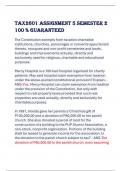Tax2601 Assignment 5 Semester 2
100 % guaranteed
The Constitution exempts from taxation charitable
institutions, churches, parsonages or convents appurtenant
thereto, mosques and non-profit cemeteries and lands,
buildings and improvements actually, directly and
exclusively used for religious, charitable and educational
purposes.
Mercy Hospital is a 100-bed hospital organized for charity
patients. May said hospital claim exemption from taxation
under the above-quoted constitutional provision? Explain. -
ANS-Yes. Mercy Hospital can claim exemption from taxation
under the provision of the Constitution, but only with
respect to real property taxes provided that such real
properties are used actually, directly and exclusively for
charitable purposes.
In 1991, Imelda gave her parents a Christmas gift of
P100,000.00 and a donation of P80,000.00 to her parish
church. She also donated a parcel of land for the
construction of a building to the PUP Alumni Association, a
non-stock, nonprofit organization. Portions of the building
shall be leased to generate income for the association. Is
the donation to the parish church subject to tax? - ANS-The
donation of P80,000.00 to the parish church, even assuming
,that it is exclusively for religious purposes, is not tax-exempt
because exemption granted under ART VI, Section 28(3) of
the Constitution applies only to real estate taxes.
X sold a piece of land to the United Church of Christ of
Quezon City, Inc. The land is to be devoted strictly for
religious purposes by the Church. When the Church tried to
register the title of the land, the Registry of Deeds refused
claiming that the CGT was not paid.
Is the transaction exempt from the CGT? Reason - ANS-No.
Under section 21(e) in relation to Section 49(a)(4) of the
NIRC, the seller is the one liable for the payment of the
Capital Gain Tax (CGT) from the sale of real property by an
individual taxpayer. Meanwhile, the Church in this instant
case is the buyer.
Hence, Section 28(4) of the 1987 Constitution, which
exempts church lands, buildings and improvements, does
not apply because the obligation to pay the CGT herein is
imposed on X, the seller, and not on the Church.
Since payment of the CGT is a condition precedent for the
registration of the transfer certificate of the title to real
property, the non-payment herein by the seller is a valid
reason for the Registry of Deeds to deny the transfer of title
to the subject land.
,Under Article XIV, Section 4(3) of the 1987 Constitution, all
revenues and assets of non-stock, non-profit educational
Institutions, used actually, directly and exclusively for
educational purposes, are exempt from taxes and duties
Describe the power of taxation. May a legislative body enact
laws to raise revenues in the absence of a constitutional
provision granting said body the power to tax? Explain. -
ANS-The power of taxation is inherent in the State, being an
attribute of sovereignty. As an incident of sovereignty, the
power to tax has been described as unlimited in its range,
acknowledging in its very nature no limits, so that security
against its abuse is to be found only in the responsibility of
the legislature which imposes the tax on the constituency
who are to pay it (Mactan Cebu Int'l Airport Authority v.
Marcos)
What is the power of Taxation as an attribute of sovereignty -
ANS-The power of taxation is an essential and inherent
attribute of sovereignty, belonging as a matter of right to
every independent government, without being expressly
conferred by the people (Pepsi-Cola Bottling Co v Mun of
Tanauan, Leyte)
Why is the power to tax considered inherent in a sovereign
State? - ANS-It is considered inherent in a sovereign State
because it is a necessary attribute of sovereignty. Without
this power, no sovereign State can exist nor endure. The
power to tax proceeds upon the theory that the existence of
a government is a necessity.
, The power to tax is an essential and inherent attribute of
sovereignty, belonging as a matter of right to every
independent State.
No sovereign State can continue to exist without the means
to pay its expenses, and for those means, it has the right to
compel all citizens and property within its limits to
contribute; hence, the emergence of power to tax.
May Congress under the 1987 Constitution, abolish the
power to tax of local governments? - ANS-No, Congress
cannot abolish what is expressly granted by the
fundamental law. The only authority conferred to Congress
is to provide guidelines and limitations on the local
government's exercise of the power to tax (Sec. 5, Art. X,
1987 Constitution)
Q: In our jurisdiction, which of the following statements may
be erroneous? Justify your answer. Taxes are pecuniary in
nature Taxes are enforced charges and contributions Taxes
are imposed on persons and property within the territorial
jurisdiction of a State Taxes are levied by the executive
branch of government Taxes are assessed according to a
reasonable rule of apportionment - ANS-Taxes are levied by
the executive branch of government. This statement is
erroneous because "levy" refers to the act of imposition by
the legislature which is done through the enactment of a tax
law. Levy is an exercise of the power to tax, which is




